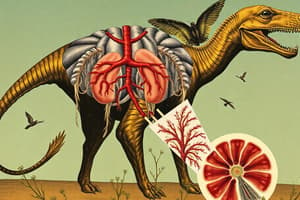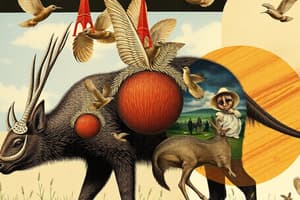Podcast
Questions and Answers
What adaptation strategy do animals use to blend in with their environment?
What adaptation strategy do animals use to blend in with their environment?
- Developing social structures
- Shaping their bodies (correct)
- Regulating physiological processes
- Exhibiting distinct behaviors
Which species has combined lungs and gills to survive in wetland environments?
Which species has combined lungs and gills to survive in wetland environments?
- Invasive species
- Apple Snail (correct)
- Eastern Fence Lizard
- Red Imported Fire Ant
What does the Eastern Fence Lizard demonstrate flexibility against?
What does the Eastern Fence Lizard demonstrate flexibility against?
- Extreme temperatures
- Invasive species (correct)
- Camouflaging techniques
- Physiological regulation
How do animals shape their bodies to cope with challenges?
How do animals shape their bodies to cope with challenges?
What do animals develop to ensure safety in numbers?
What do animals develop to ensure safety in numbers?
Why is understanding animal adaptations important according to the text?
Why is understanding animal adaptations important according to the text?
What is the unique adaptation of Right Whales mentioned in the text?
What is the unique adaptation of Right Whales mentioned in the text?
Which animal mentioned in the text uses echolocation for navigation?
Which animal mentioned in the text uses echolocation for navigation?
What is the main adaptation of Clouded Leopards for climbing mentioned in the text?
What is the main adaptation of Clouded Leopards for climbing mentioned in the text?
Which animal mentioned in the text has a defense mechanism that involves strange leg movement?
Which animal mentioned in the text has a defense mechanism that involves strange leg movement?
What adaptation helps Snakes locate warm-blooded prey according to the text?
What adaptation helps Snakes locate warm-blooded prey according to the text?
Which animal mentioned in the text relies on pinpoint precision due to asymmetrical ears?
Which animal mentioned in the text relies on pinpoint precision due to asymmetrical ears?
Flashcards are hidden until you start studying
Study Notes
Discovering Animal Adaptations
Understanding an animal's unique traits that aid in surviving within specific environments is vital to comprehending its evolution and success. Let's explore various examples of fascinating adaptations found throughout the animal kingdom.
Right Whales, Clouded Leopards, Barred Owls
A video tutorial from the Smithsonian's National Museum of Natural History highlights the adaptations of these species:
- Right Whales: Large mouths and bristle-like bridges provide efficient filter feeding, helping them consume tiny plankton.
- Clouded Leopards: Short legs, long claws, and non-retractile nails aid in climbing steep tree trunks and grasping branches.
- Barred Owls: Exceptional hearing range and pinpoint precision thanks to asymmetrical ears are crucial for locating prey.
Darkness Dwellers
Several animals thrive in darkness, demonstrating extraordinary senses essential for survival. For instance:
- Owls: Enhanced visual acuity during twilight and stealthily evolving ears help locate prey.
- Bats: Navigate via echolocation, allowing them to communicate intricately and track prey efficiently.
- Spiders: Strange leg movement may act as both defense mechanism and communication tool.
- Snakes: Detect heat to locate warm-blooded prey through specialized "forgotten genes," akin to radar sensors.
Environmental Flexibility
Some animals have inherited skills that equip them to adapt to diverse environments. Take the Apple Snail, for instance; equipped with combined lungs and gills, it survives in varying wetland contexts.
Invasive Species Response
Notably, the Eastern Fence Lizard demonstrates remarkable flexibility against invasive species (such as Red Imported Fire Ants), exhibiting distinct behaviors depending upon their proximity to ant colonies.
Habitats and Predators
Animals have honed several strategies to overcome challenges posed by habitat and predators, including:
- Camouflaging their appearance.
- Shaping their bodies to perform optimally in their environment.
- Regulating physiological processes to endure extreme temperatures.
- Developing social structures to maintain safety in numbers.
In conclusion, understanding animal adaptations offers insights into our natural world and contributes to conservation efforts aimed at preserving ecosystem balance. As our species continues to affect nature, animals continue to adapt to newfound pressures. By studying their strategic responses, we further our appreciation and respect for their biological prowess.
Studying That Suits You
Use AI to generate personalized quizzes and flashcards to suit your learning preferences.




